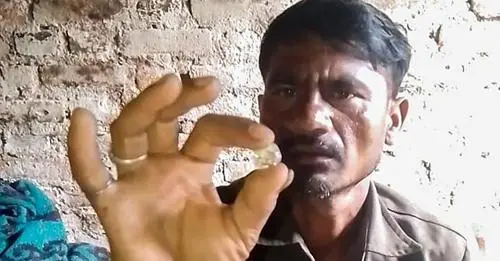Indebted Indian Labourer Finds Life-changing $100,000 Diamond
Raju Gond normally makes about $4 a day taking whatever work comes his way to provide for his large family, working in fields or diamond mines in his home state of Madhya Pradesh, or as a tractor driver for a wealthier farmer.
- Advertisement -
A debt-ridden labourer in Central India said his family’s life has been “changed forever” after he unearthed a 19.22-carat diamond worth almost $100,000.
Raju Gond normally makes about $4 a day taking whatever work comes his way to provide for his large family, working in fields or diamond mines in his home state of Madhya Pradesh, or as a tractor driver for a wealthier farmer.
- Advertisement -
But the 40-year-old and his younger brother Rakesh sometimes pay $9.50 a day to dig for gold in a 64-square-meter (690-square-foot) plot of government land.
- Advertisement -
And it was there that he made his fortuitous find. After laying his hands on the stone on Wednesday, he said, his heart raced as he cleaned the dirt off it. With every stroke of his finger, the stone shone brighter and brighter.
“It shone spectacularly; I knew it was a diamond right then!” an audibly delighted Gond told CNN from his home in Panna district.
He and Rakesh hugged and jumped in delight. They got onto their bike and hurtled 7 miles (11 kilometers) back home from the shallow mine in Krishna Kalyanpur to share the news with their family. They then took their mother along to the local Panna Diamond Office to have the stone evaluated.
Anupam Singh, the official diamond examiner, took hold of the diamond and had it weighed. “This is a white diamond of 19.22 carat,” he told CNN. It was valued at about $95,500.
Singh was quick to add that Panna is known for its rich diamond reserves. “In 1961 someone found a 54.55-carat diamond, then in 2018 someone found a 42-carat diamond, and now this,” he said, adding that smaller diamonds were also found earlier this year.
Gond may have the weather to thank for his good fortune.
Two months ago, monsoons descended upon the region, washing away many work opportunities. Rather than sit at home, the family felt compelled to search for diamonds.
“What we have to do is fill in a form, give identification proof, provide photos and pay 800 rupees ($9.50) to the government,” Gond explained. “When we are done searching there we can apply again to search for diamonds on another patch of land.”
- Advertisement -
Singh, the diamond examiner, said the government leases shallow mines to families who want to look for the gemstones, under the supervision of local officials. The government takes an 11.5% royalty for any find, plus a small tax, and gives the remaining amount to the person who found it.
The diamond office will wait for the value of its inventory to exceed $360,000 before holding an auction, Singh said, after which Gond will receive his payout.
“Right now, we have diamonds worth half that amount,” he said.
Planning for the Future
Gond has opened a bank account and is eagerly waiting for the money to be credited. “Our lives have changed forever,” he said.
“The first thing I’ll do is pay back debt of ($6,000). Then we will invest in all children getting educated, building homes, buy some land and maybe a tractor too,” he said.
Lately, he said, it has been hard to make ends meet. His family includes his parents, wife, seven children, and the families of his younger brother and sister.
When he was growing up, his father and grandfathers would tell Gond stories of people who found diamonds in the soil, “and how the fate of the family had changed after that.” Today, he says, he has his own story to share.
And on Friday, the brothers were back at the mine.
“We woke up early and got out again,” Gond told CNN. “We are already in the shallow mine. We will find more diamonds!”
Source:opemsuo.com
- Advertisement -


